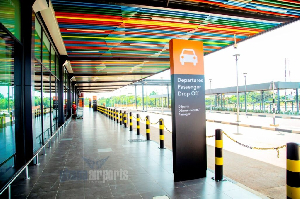Parliament, recalled from its summer recess, yesterday resumed its consideration of the draft National Health Insurance Bill, designed to give legal backing to the National health Insurance Scheme (NHIS).
Government had programmed the bill to be passed before the recess earlier this month but Parliament was constrained to defer it following public outcry that the bill was being rushed without stakeholders being given the opportunity to sort out such issues as its controversial mode of financing.
To provide such an opportunity, the Parliamentary Select Committees on Health and Finance held joint public fora in the regional capitals to address the fears and misgivings of the public especially workers.
A sticking point right from Day One, has been the proposed use of 2.5 percent of workers contributions to the Social Security and National Insurance Trust (SSNIT) towards their pension.
The Health Minister, Dr. Kwaku Afriyie, says that deduction would constitute the premium of the contributors of SSNIT to the NHIS.
This meant an annual deduction from workers’ SSNIT accruals.
The President, Mr. John Agyekum Kufuor, in his recent tour of the Greater Accra Region, however, muddied the waters further when he said that the 2.5 percent deduction from workers’ SSNIT contribution for the NHIS would be a loan.
That suggests, on the other hand, that it was going to be a one-off deduction. If it is, how then would workers pay for their NHIS premiums in subsequent years? If to get around that problem the deductions from SSNIT funds become annual, how does the government pay for a loan that recurs yearly?
In response to workers concerns, the Health Minister gave the assurance during the public fora that in the unlikely event that the 2.5 percent deductions from SSNIT funds affect the Trust’s ability to pay pensions, government would pay pension to SSNIT contributions. But where is the assurance that this would indeed happen for all time? Can the NPP government morally commit its successors without their prior consent for such a pledge?
Beyond apprehension over their comfort in retirement, workers also think that the stated premium for traders in the informal sector, pegged at ?36,000.00 per annum, is too low. Of course, looking at the rakings of the market queens at Makola, Accra, Kejetia, Kumasi, Market Circle, Takoradi and in other regional capitals, ?36,000.00 for a year is negligible.
However, it is not every trader at Makola who makes millions daily even in Accra, not to talk of those in the villages and hamlets across the country. In fixing such rates, the yardstick should not be the highest earners but the least earners.
Also, in response to the workers’ discomfort over the " Coroners" of the informal sector premium the Health Minister said that it is more or less equal to the 2.5 percent deduction of the least paid contributors to SSNIT.
From the foregoing analysis, The Heritage thinks that the claim that the 2.5 percent deduction from SSNIT would be a loan is an afterthought dreamed up by the government to extricate itself out of a tight corner.
We believe the Health Minister’s assurance that SSNIT ought be assisted by government to pay pensions if it become necessary as a more serious option.
However, the government would need to give the Trades Union Congress (TUC) a written undertaking to that effect.
But before that undertaking is given The Heritage believes the NPP Government need to get the agreement of the other partners for the payment of workers pension, should SSNIT become incapacitated by the 2.5 percent deduction for the NHIS.
In countering workers’ objection to the use of their SSNIT contributions for the NHIS, the Health Minister has also pointed out that the SSNIT enabling act requires one percent of contributions to be used for health insurance for workers.
The Heritage thinks the NPP Government will be well advised to stick to that one percent SSNIT deduction annually, collect ?36,000.00 annually from the informal sector operators and supplement those two payments with some level of budgetary allocation.
We think, however, that the major funding for the NHIS should be the 2.5 percent NHIS levy, which the NPP Government is very cowardly refusing to admit is an increase in the Value Added TAX (VAT) rate, from 12.5 percent to 15 percent.
Regrettably it is because of this cowardice that the NHIS bill is seeking to afflict Ghanaians with another unwieldy bureaucracy in the name of an NHIS secretariat.
The fact that the NPP in opposition opposed the introduction of the VAT, the fact that the NPP government is in arrears of the 2.5 percent VAT payment into the GETFund is no reason why it should be afraid to be truthful with Ghanaians, that VAT as a tax tool is very useful for national development.
The Heritage believes that the NPP can easily rationalise away its initial opposition to VAT on the ground that it was because it was going to be spent mainly on unproductive government functionaries and their agents. The difference this time, as it was the case with the 2.5 percent increase for the GETFund, is that the new increase is for a more worthwhile national purpose – the health of the people.
The Heritage regrets the Government’s increasing inability to be straightforward on national issues – inflation rate, GETFund arrears. This cannot be the trait of a government that prides itself on being bold in taking bitter decisions. Please let’s be straightforward on national issues.
General News of Wednesday, 20 August 2003
Source: heritage
















